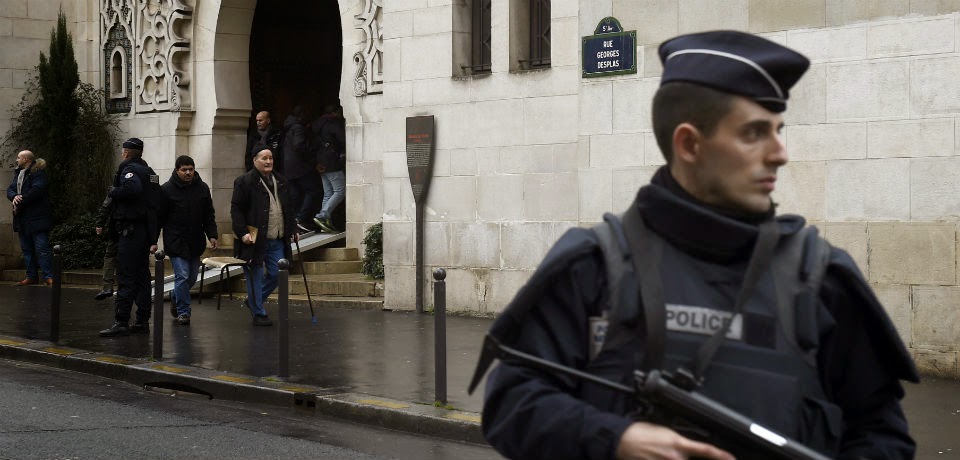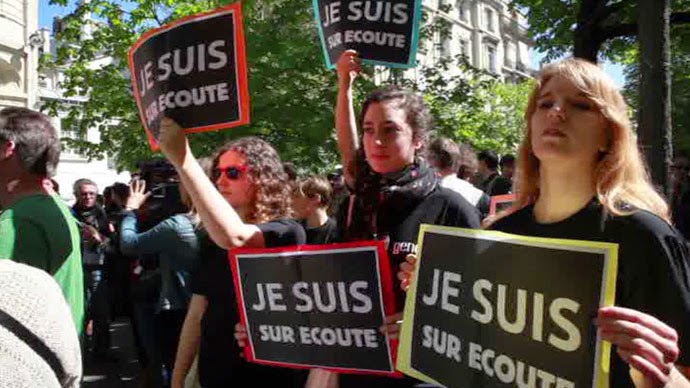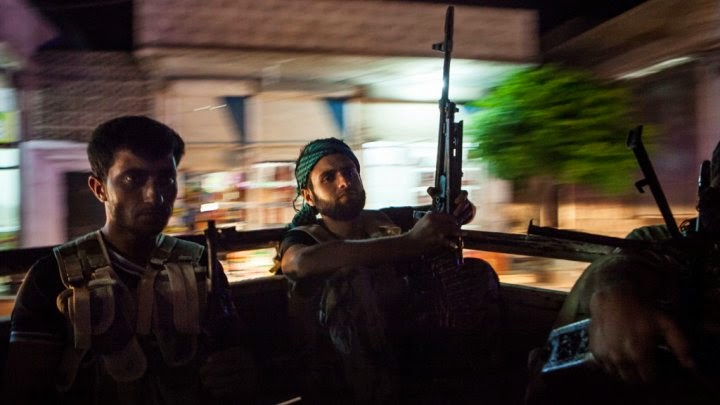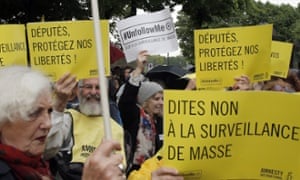OOPS! I better not speak about France too much cause H.L. has limited freedoms here.
The guardian article is here...
http://www.theguardian.com/world/20...veillance-law-in-wake-of-charlie-hebdo-attack
French Surveillance Law Amid Terror of Own Creation
Can a new surveillance law help stop terrorists the government is already tracking and simply choosing not to stop?
May 15, 2015 (Tony Cartalucci - NEO) - France has announced that in the wake of the so-called "Charlie Hebdo Shooting," it will be passing a controversial new bill granting security agencies unprecedented powers to tap the communications of France's population without judicial overview.

Impossible to pass without having first provoked fear, hatred, division, and hysteria across the French population, and still facing stiff resistance from civil liberty activists, the bill's passage raises further suspicions regarding the fatal January 2015 shooting in regards to who organized the incident and who stood most to benefit.
The Guardian in its article, "France passes new surveillance law in wake of Charlie Hebdo attack," would report:
The French parliament has overwhelmingly approved sweeping new surveillance powers in the wake of the terrorist attacks in Paris in January that killed 17 people at the satirical magazine Charlie Hebdo and a kosher grocery in Paris. The new bill, which allows intelligence agencies to tap phones and emails without seeking permission from a judge, sparked protests from rights groups who claimed it would legalise highly intrusive surveillance methods without guarantees for individual freedom and privacy.The Guardian would also claim that:
The French prime minister, Manuel Valls, defended the bill as “necessary and proportionate”, saying that to compare it to the mass surveillance Patriot Act introduced in the United States after the 9/11 attacks was a lie. He said that the previous French law on wiretapping dated back to 1991, “when there were no mobile phones or internet,” and the new bill was crucial in the face of extremist threats.Not a Lack of Surveillance
As seen in nearly every recent terror attack both in Europe and North America including the "Charlie Hebdo shooting" and the more recent Garland, Texas attack, the alleged suspects behind the attacks all have one thread in common - they were all already under the watch of security agencies for years, some even imprisoned one or more times for terror-related and/or other violent offenses, some even having traveled overseas to fight alongside Western-backed terrorists in Syria, Iraq, and beyond.
 The Guardian itself admits that the French government alone has over 1,400 people under watch, including hundreds of terrorists who have recently returned from fighting alongside Western-backed terrorists including Al Qaeda and its regional franchise, the "Islamic State" (ISIS) in Syria, Iraq, and Yemen. Among these monitored potential risks were in fact the suspects behind the "Charlie Hebdo shooting."
The Guardian itself admits that the French government alone has over 1,400 people under watch, including hundreds of terrorists who have recently returned from fighting alongside Western-backed terrorists including Al Qaeda and its regional franchise, the "Islamic State" (ISIS) in Syria, Iraq, and Yemen. Among these monitored potential risks were in fact the suspects behind the "Charlie Hebdo shooting."
Slate Magazine would report in their article, "The Details of Paris Suspect Cherif Kouachi’s 2008 Terrorism Conviction," that:
Kouachi was arrested in January 2005, accused of planning to join jihadists in Iraq. He was said to have fallen under the sway of Farid Benyettou, a young "self-taught preacher" who advocated violence, but had not actually yet traveled to Iraq or committed any acts of terror. Lawyers at the time said he had not received weapons training and "had begun having second thoughts," going so far as to express "relief" that he'd been apprehended.Kourachi and his brother would be reported to have traveled to the Middle East to receive training from Al Qaeda, then to have fought in Syria in a war backed in part by France, before returning home and carrying out their grisly terror attack, all while being tracked by French intelligence.
If Kouachi previously could be arrested for "association with wrongdoers with the intention of committing a terrorist act," why wasn't he arrested immediately upon his return to France for having received and employed military training by a terrorist organization?
CNN would report in an article titled, "France tells U.S. Paris suspect trained with al Qaeda in Yemen," that:
Western intelligence officials are scrambling to learn more about possible travel of the two Paris terror attack suspects, brothers Said and Cherif Kouachi, with new information suggesting one of the brothers recently spent time in Yemen associating with al Qaeda in that country, U.S. officials briefed on the matter told CNN. Additional information from a French source close to the French security services puts one of the brothers in Syria.To explain how terrorists well-known to France's legal system and intelligence community could simply "disappear," the Wall Street Journal in an article titled, "Overburdened French Dropped Surveillance of Brothers," would attempt to claim:
The terror attacks in Paris that have killed 17 people over three days this week represent one of the worst fears—and failures—of counterterrorist officials: a successful plot coordinated by people who had once been under surveillance but who were later dropped as a top priority. The U.S. provided France with intelligence showing that the gunmen in the Charlie Hebdo massacre received training in Yemen in 2011, prompting French authorities to begin monitoring the two brothers, according to U.S. officials. But that surveillance of Said and Chérif Kouachi came to an end last spring, U.S. officials said, after several years of monitoring turned up nothing suspicious.

Image: Terrorists waging the West's proxy war in Syria have been provided cash, weapons, and equipment by several European nations, chief among them, France.
It is a narrative that begs to be believed - considering the brothers had already tangled with the law, already traveled to Yemen to receive training from Al Qaeda, and with evidence suggesting they were indeed still being tracked since it is now known they have recently returned from Syria. The Wall Street Journal would also claim that France depends heavily on US intelligence, contradicting US intelligence officials who have said their information came from their French counterparts.
France reportedly has over 1,000 citizens under surveillance who have recently traveled to Iraq and Syria, believed to have fought alongside terrorists France itself has been arming. In an NBC article titled, "French Intelligence Is Tracking 1,000 Who Have Been to Iraq, Syria: Expert," it is reported that:
"French intelligence is mostly focused today on more than 1,000 French citizens that traveled to Syria and Iraq since 2012," said Jean-Charles Brisard, the author of "Zarqawi: The New Face of Al-Qaeda." He added that one-fifth of them were being tracked around the clock. "This is a problem of resources," he added. "We cannot follow everyone." Brisard said the brothers had been "well known to French intelligence [for] several years now."
The problem that led up to the "Charlie Hebdo shooting" was clearly not a lack of intelligence or surveillance. French security agencies more than adequately identified the "Charlie Hebdo shooting" perpetrators as potential threats and tracked them for years beforehand. The problem was what appears to be a deliberate effort to keep these terrorists roaming freely among society. Free to join French-backed mercenary forces abroad, and free to commit heinous acts of terror at home, both serving the singular agenda of expanding Western hegemony abroad while preserving the primacy of select special interests at home.
New Surveillance is For Crushing Freedom, Not Terror
As already explained in painstaking detail, had the French government been interested in actually stopping terrorism, including the flight of its own citizens to the Middle East to participate in a war the French government itself is backing, it could have done so easily. Existing laws and France's current security agencies successfully identified the impending threat that led to the "Charlie Hebdo shooting," but willfully failed to stop it - with certain factions of French intelligence having even played a potential role in executing it.

Image: French planes took part in the utter devastation of Libya in 2011, leaving the nation in ruins and handing it over to Al Qaeda, whom NATO, with French assistance, provided air cover and even weapons, cash, and political backing to.
Therefore, clearly the solution to stopping terrorism is in fact evicting the criminal special interests occupying power throughout the French government, and more broadly, from across the Western World. However, such an eviction will now become exponentially more difficult to execute, thanks to France's new surveillance laws that give them virtually unhindered access to their citizenry's data, granting them an unparalleled strategic advantage.
Indeed, France's new surveillance laws will not stop terrorism at home nor quell the legions of terror they are backing, ravaging lands abroad - instead - they will ensure the uncontested expansion of terror used to coerce the French population at home while justifying and carrying out extraterritorial conquest abroad.
Tony Cartalucci, Bangkok-based geopolitical researcher and writer, especially for the online magazine“New Eastern Outlook”.
The guardian article is here...
http://www.theguardian.com/world/20...veillance-law-in-wake-of-charlie-hebdo-attack
French Surveillance Law Amid Terror of Own Creation
Can a new surveillance law help stop terrorists the government is already tracking and simply choosing not to stop?
May 15, 2015 (Tony Cartalucci - NEO) - France has announced that in the wake of the so-called "Charlie Hebdo Shooting," it will be passing a controversial new bill granting security agencies unprecedented powers to tap the communications of France's population without judicial overview.

Impossible to pass without having first provoked fear, hatred, division, and hysteria across the French population, and still facing stiff resistance from civil liberty activists, the bill's passage raises further suspicions regarding the fatal January 2015 shooting in regards to who organized the incident and who stood most to benefit.
The Guardian in its article, "France passes new surveillance law in wake of Charlie Hebdo attack," would report:
The French parliament has overwhelmingly approved sweeping new surveillance powers in the wake of the terrorist attacks in Paris in January that killed 17 people at the satirical magazine Charlie Hebdo and a kosher grocery in Paris. The new bill, which allows intelligence agencies to tap phones and emails without seeking permission from a judge, sparked protests from rights groups who claimed it would legalise highly intrusive surveillance methods without guarantees for individual freedom and privacy.The Guardian would also claim that:
The French prime minister, Manuel Valls, defended the bill as “necessary and proportionate”, saying that to compare it to the mass surveillance Patriot Act introduced in the United States after the 9/11 attacks was a lie. He said that the previous French law on wiretapping dated back to 1991, “when there were no mobile phones or internet,” and the new bill was crucial in the face of extremist threats.Not a Lack of Surveillance
As seen in nearly every recent terror attack both in Europe and North America including the "Charlie Hebdo shooting" and the more recent Garland, Texas attack, the alleged suspects behind the attacks all have one thread in common - they were all already under the watch of security agencies for years, some even imprisoned one or more times for terror-related and/or other violent offenses, some even having traveled overseas to fight alongside Western-backed terrorists in Syria, Iraq, and beyond.
 The Guardian itself admits that the French government alone has over 1,400 people under watch, including hundreds of terrorists who have recently returned from fighting alongside Western-backed terrorists including Al Qaeda and its regional franchise, the "Islamic State" (ISIS) in Syria, Iraq, and Yemen. Among these monitored potential risks were in fact the suspects behind the "Charlie Hebdo shooting."
The Guardian itself admits that the French government alone has over 1,400 people under watch, including hundreds of terrorists who have recently returned from fighting alongside Western-backed terrorists including Al Qaeda and its regional franchise, the "Islamic State" (ISIS) in Syria, Iraq, and Yemen. Among these monitored potential risks were in fact the suspects behind the "Charlie Hebdo shooting."Slate Magazine would report in their article, "The Details of Paris Suspect Cherif Kouachi’s 2008 Terrorism Conviction," that:
Kouachi was arrested in January 2005, accused of planning to join jihadists in Iraq. He was said to have fallen under the sway of Farid Benyettou, a young "self-taught preacher" who advocated violence, but had not actually yet traveled to Iraq or committed any acts of terror. Lawyers at the time said he had not received weapons training and "had begun having second thoughts," going so far as to express "relief" that he'd been apprehended.Kourachi and his brother would be reported to have traveled to the Middle East to receive training from Al Qaeda, then to have fought in Syria in a war backed in part by France, before returning home and carrying out their grisly terror attack, all while being tracked by French intelligence.
If Kouachi previously could be arrested for "association with wrongdoers with the intention of committing a terrorist act," why wasn't he arrested immediately upon his return to France for having received and employed military training by a terrorist organization?
CNN would report in an article titled, "France tells U.S. Paris suspect trained with al Qaeda in Yemen," that:
Western intelligence officials are scrambling to learn more about possible travel of the two Paris terror attack suspects, brothers Said and Cherif Kouachi, with new information suggesting one of the brothers recently spent time in Yemen associating with al Qaeda in that country, U.S. officials briefed on the matter told CNN. Additional information from a French source close to the French security services puts one of the brothers in Syria.To explain how terrorists well-known to France's legal system and intelligence community could simply "disappear," the Wall Street Journal in an article titled, "Overburdened French Dropped Surveillance of Brothers," would attempt to claim:
The terror attacks in Paris that have killed 17 people over three days this week represent one of the worst fears—and failures—of counterterrorist officials: a successful plot coordinated by people who had once been under surveillance but who were later dropped as a top priority. The U.S. provided France with intelligence showing that the gunmen in the Charlie Hebdo massacre received training in Yemen in 2011, prompting French authorities to begin monitoring the two brothers, according to U.S. officials. But that surveillance of Said and Chérif Kouachi came to an end last spring, U.S. officials said, after several years of monitoring turned up nothing suspicious.

Image: Terrorists waging the West's proxy war in Syria have been provided cash, weapons, and equipment by several European nations, chief among them, France.
It is a narrative that begs to be believed - considering the brothers had already tangled with the law, already traveled to Yemen to receive training from Al Qaeda, and with evidence suggesting they were indeed still being tracked since it is now known they have recently returned from Syria. The Wall Street Journal would also claim that France depends heavily on US intelligence, contradicting US intelligence officials who have said their information came from their French counterparts.
France reportedly has over 1,000 citizens under surveillance who have recently traveled to Iraq and Syria, believed to have fought alongside terrorists France itself has been arming. In an NBC article titled, "French Intelligence Is Tracking 1,000 Who Have Been to Iraq, Syria: Expert," it is reported that:
"French intelligence is mostly focused today on more than 1,000 French citizens that traveled to Syria and Iraq since 2012," said Jean-Charles Brisard, the author of "Zarqawi: The New Face of Al-Qaeda." He added that one-fifth of them were being tracked around the clock. "This is a problem of resources," he added. "We cannot follow everyone." Brisard said the brothers had been "well known to French intelligence [for] several years now."
The problem that led up to the "Charlie Hebdo shooting" was clearly not a lack of intelligence or surveillance. French security agencies more than adequately identified the "Charlie Hebdo shooting" perpetrators as potential threats and tracked them for years beforehand. The problem was what appears to be a deliberate effort to keep these terrorists roaming freely among society. Free to join French-backed mercenary forces abroad, and free to commit heinous acts of terror at home, both serving the singular agenda of expanding Western hegemony abroad while preserving the primacy of select special interests at home.
New Surveillance is For Crushing Freedom, Not Terror
As already explained in painstaking detail, had the French government been interested in actually stopping terrorism, including the flight of its own citizens to the Middle East to participate in a war the French government itself is backing, it could have done so easily. Existing laws and France's current security agencies successfully identified the impending threat that led to the "Charlie Hebdo shooting," but willfully failed to stop it - with certain factions of French intelligence having even played a potential role in executing it.

Image: French planes took part in the utter devastation of Libya in 2011, leaving the nation in ruins and handing it over to Al Qaeda, whom NATO, with French assistance, provided air cover and even weapons, cash, and political backing to.
Therefore, clearly the solution to stopping terrorism is in fact evicting the criminal special interests occupying power throughout the French government, and more broadly, from across the Western World. However, such an eviction will now become exponentially more difficult to execute, thanks to France's new surveillance laws that give them virtually unhindered access to their citizenry's data, granting them an unparalleled strategic advantage.
Indeed, France's new surveillance laws will not stop terrorism at home nor quell the legions of terror they are backing, ravaging lands abroad - instead - they will ensure the uncontested expansion of terror used to coerce the French population at home while justifying and carrying out extraterritorial conquest abroad.
Tony Cartalucci, Bangkok-based geopolitical researcher and writer, especially for the online magazine“New Eastern Outlook”.

 ...... France? ....... outchere in the U.S.
...... France? ....... outchere in the U.S. 